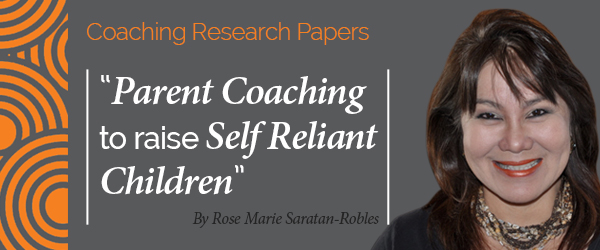 Research Paper By Rose Marie Saratan
Research Paper By Rose Marie Saratan
(Parent and Child Relationship Coach, SWITZERLAND)
Significance of the Study
There are various books in parenting that tell us the methods and concepts of raising self- reliant children. This research is aimed at supporting these different methods and concepts to bring awareness to single mothers and parents on the importance of having self- reliant children and help them achieve positive outcomes.
This research is made with only one objective in mind: How will our child/children be if we are no longer around? What kind of decisions will they be making if they were all alone and no one to turn to for support?
We cannot deny that giving our child/ children the ability to cope with and overcome adversity is an essential component for all children because daily adversities can compromise their current and future well- being. In the end, it is not only our child/children that suffer, we, as parent/ parents will not enjoy the serenity of having had our child/ children prepared.
Why do we give special attention here to single mothers?
The New York Times of March 10, 2010 state that 15.9% of children across the industrialized world live in single parent homes. Usually it is just a mother.
In a 1999 report on children at risk, the Casey Foundation estimates that one in seven children in America faced at least one risk factor such as growing up in a single- parent household, thus affecting their chance for success.
These studies indicate that parents in such homes typically require additional support1, p.291.
Thru coaching, we aim to support the parent/parents to lessen, avoid, or prevent the struggle and difficulties that come with the change and provide a lasting, stable and happy home and a meaningful life for all.
Introduction
What is self- reliance? It is the belief / the ability to be capable of successfully dealing with the challenges of life; to listen to one’s self, act according to one’s convictions, rather than letting other people, things or events decide what you should do, be or have.
What are our dreams and wishes as parents for our children? It is happiness, success in studies, satisfaction with their lives and solid friendships1, p.1. It is having our children secured and confident in all ways, equipped to successfully confront challenges and bounce back from setbacks.
Knowing what needs to be done is not the same as knowing how to do it.
Data Methodology
Raising a self-reliant child is all about setting the example, teaching our children the value of honesty, respect, responsibility, compassion, self- worth, empathy. It is about knowing when to praise, how to praise and how much to give of that praise. It is about teaching our children how to solve problems, rise above difficulties, finding their strengths and making the best of themselves from that strength. It is about empowering them and making them self- directed. It is modelling and teaching them the meaning of competence and cooperation and how to be open and graciously accept criticism as well as compliments. It is using positive discipline, expressing anger without doing damage, teaching without punishing, inspiring remorse and not resentment, showing love without spoiling, lending support without hovering, and raising a problem solver.
And it is about celebrating the baby steps that come with every success.
Children are not ‘little adults’. We cannot force children to see things from our perspective2, p.22
It is our job to be supportive and encouraging4, p.137. It is our job to help our kids learn and see themselves as capable and equipped to effect any changes and make independent and correct decisions.
Creative power is influence, not force3, p.12 .
Exploring our philosophy of parenting helps us to separate the good from the bad and examine various parenting tools3, p.2. In all parenting books, we are warned repeatedly about the huge impact control, coercing, punishment, threatening and physical/ verbal abuse can do to a child. We also see how many parents still make the same mistake of doing everything for their children.